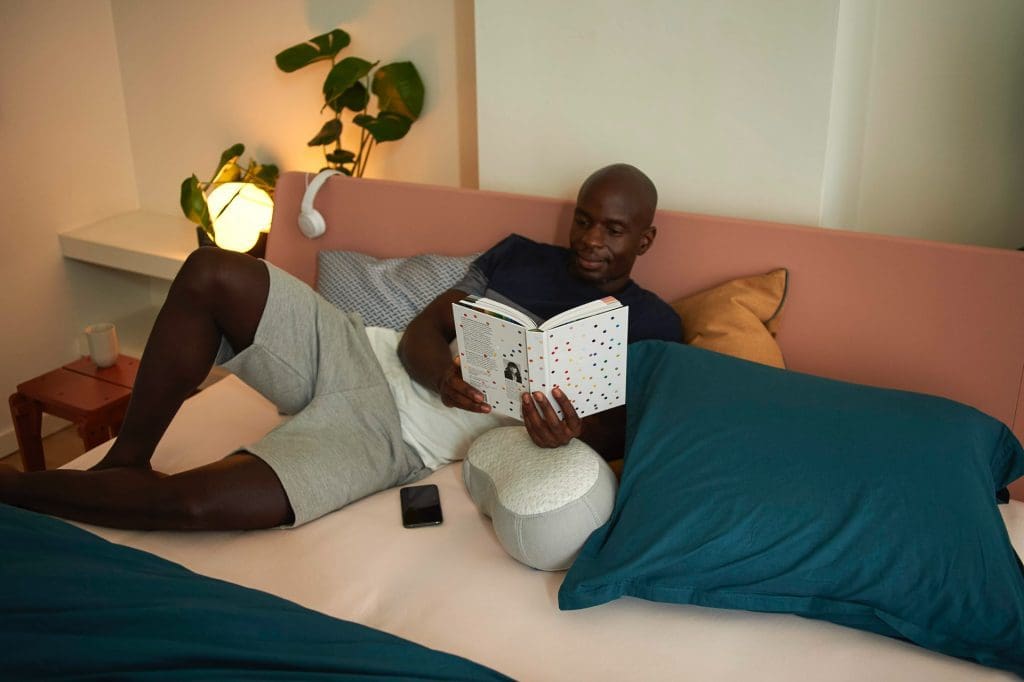Sleep deprivation is a major cause of poor physical and mental health around the globe. Stress is by far the most dangerous of the many causes of poor sleep health, such as less exposure to daylight, an irregular sleep schedule, an inappropriate diet, etc.. We say this because the relationship between stress and sleeplessness is mutually dependent on each other. This can sometimes push you through a never-ending cycle, where you experience a lack of sleep and continue accumulating more stress due to sleep deprivation. Therefore, we are going to shed more light on the relationship between stress and sleep so that you can get out of this vicious cycle of poor sleeping and stress at the earliest.
Table of Contents
-The relationship between stress and sleep
Most sleep experts suggest that our body needs about 7 to 9 hours of sleep consistently to function properly. However, recent global sleeping trends suggest that about one-third of the US people experience some sort of sleep disorder or the other and are thus deprived of a good night’s sleep. According to this recent study that looked at 63 past research pieces on the relationship between psychological stress and sleep, complications such as reduced slow-wave sleep increased sleep disturbances, and poor REM sleep are inextricably linked to stress.
Other studies have also found that most people suffering from major sleep disorders like insomnia, obstructive sleep apnea, narcolepsy, restless leg syndrome, etc., were also plagued with stress on a consistent level. Secretion of the body’s natural stress hormones such as cortisol is considered important to increase daytime alertness and regulate the fight-or-flight response. However, a prolonged state of such alertness is seriously detrimental to the sleep health of the body. Let us, therefore, look at some of the ways in which the body’s stress levels can be kept at normal so that you experience improved sleep quality and quantity.

-Tips to master stress and achieve good sleep health
#01 Exercise
Exercising regularly is probably the most effective way to combat stress accumulation. Even less than 30 minutes of work out every day can do wonders for the proper regulation of stress hormones like cortisol and adrenaline. Researchers in the past have observed that exercising helps alleviate stress by releasing endorphins and other neurotransmitters. Placing your workout schedule in the earlier part of the day ensures that you benefit from exposure to natural daylight, which is a great way to reduce stress and depression. Working out consistently increases your overall fitness, which in turn improves your self-esteem. This is a great way to boost confidence and counter stressful sleep.
#02 Practice meditation
The best thing about meditation is that it can be practiced at any time of the day. While the early morning is considered the most suitable time to meditate so that you can get into the flow of the day, meditating before bedtime is also a recommended option. This soothes your mind and body so that you can doze off easily once you hit the bed. You can also opt for other natural wellness measures such as bedtime yoga and progressive muscular relaxation. The latter technique helps lower physical and mental stress levels as each part of the body is addressed separately through rhythmic contraction and relaxation of muscles.
#03 Bedtime ritual

Certain pre-bedtime activities help you tone down the stress on your mind and body so that you are thoroughly relaxed when you retire to bed. Taking a warm bath dipped with a few drops of essential oils is one such example. Listening to soft music or reading a book before sleeping can also have similar effects on your mind and may help you take a much-needed break from the burden of everyday life. Another great way to counter everyday stress is to maintain a journal to jot down everyday happenings, abstract thoughts, budget plans for the month, or even a creative writing piece. The idea here is to come face-to-face with anything and everything that bothers you and increases your stress.
#04 Practice healthy sleeping habits
Considering that sleep deprivation can increase your stress levels, practicing healthy sleep habits that can counter poor sleep should be a nice way to deal with increasing stress and anxiety. Make sure that the bedroom environment is devoid of any external noise or light so that it can be as sleep-friendly as possible. Follow your sleep schedule with utmost strictness to wake up and go to sleep every day around the same time. Get yourself a new mattress that boosts sleep if your old one isn’t doing the job. Here is a comprehensive guide on a range of plush mattress sets that are extra comfortable and supportive, thanks to the easy distribution of body weight. Make sure that you do not nap for more than 30 minutes in the day, as this can make it harder for you to fall asleep at night.
#05 Mind your diet

Remember to include a lot of food and drinks in your diet rich in components that promote sleep, such as melatonin, magnesium, tryptophan amino acid, potassium, etc. Stay away from sugary and oily foods as they are known to increase the blood sugar level, which can force the body to release stress hormones to balance the effect. You should also avoid taking alcohol or caffeinated products at least 6 hours before bedtime, as they are notorious for messing up your night sleep by elevating the stress levels.
Bottom line:
Remember that the relationship between stress and sleep is cyclical. Therefore, while practicing ways to reduce stress, also work on lifestyle habits that prevent sleep deprivation. Don’t hesitate to open up about your stress to your doctor or a hypnotherapist like https://clairewinchester.co.uk/, and try to spend more time with your family and friends if it reduces your overall stress levels. We hope the above-mentioned points will help you master everyday stress and usher you toward improved sleep health.
Featured Photo by Andisheh A on Unsplash




